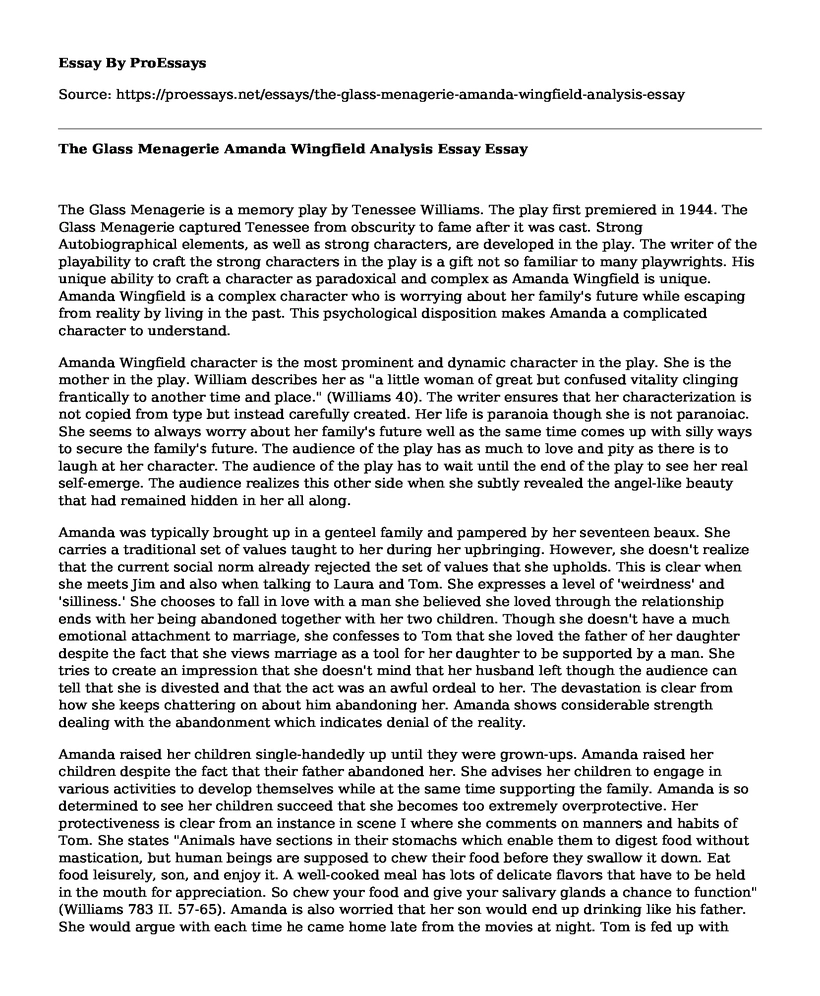The Glass Menagerie is a memory play by Tenessee Williams. The play first premiered in 1944. The Glass Menagerie captured Tenessee from obscurity to fame after it was cast. Strong Autobiographical elements, as well as strong characters, are developed in the play. The writer of the playability to craft the strong characters in the play is a gift not so familiar to many playwrights. His unique ability to craft a character as paradoxical and complex as Amanda Wingfield is unique. Amanda Wingfield is a complex character who is worrying about her family's future while escaping from reality by living in the past. This psychological disposition makes Amanda a complicated character to understand.
Amanda Wingfield character is the most prominent and dynamic character in the play. She is the mother in the play. William describes her as "a little woman of great but confused vitality clinging frantically to another time and place." (Williams 40). The writer ensures that her characterization is not copied from type but instead carefully created. Her life is paranoia though she is not paranoiac. She seems to always worry about her family's future well as the same time comes up with silly ways to secure the family's future. The audience of the play has as much to love and pity as there is to laugh at her character. The audience of the play has to wait until the end of the play to see her real self-emerge. The audience realizes this other side when she subtly revealed the angel-like beauty that had remained hidden in her all along.
Amanda was typically brought up in a genteel family and pampered by her seventeen beaux. She carries a traditional set of values taught to her during her upbringing. However, she doesn't realize that the current social norm already rejected the set of values that she upholds. This is clear when she meets Jim and also when talking to Laura and Tom. She expresses a level of 'weirdness' and 'silliness.' She chooses to fall in love with a man she believed she loved through the relationship ends with her being abandoned together with her two children. Though she doesn't have a much emotional attachment to marriage, she confesses to Tom that she loved the father of her daughter despite the fact that she views marriage as a tool for her daughter to be supported by a man. She tries to create an impression that she doesn't mind that her husband left though the audience can tell that she is divested and that the act was an awful ordeal to her. The devastation is clear from how she keeps chattering on about him abandoning her. Amanda shows considerable strength dealing with the abandonment which indicates denial of the reality.
Amanda raised her children single-handedly up until they were grown-ups. Amanda raised her children despite the fact that their father abandoned her. She advises her children to engage in various activities to develop themselves while at the same time supporting the family. Amanda is so determined to see her children succeed that she becomes too extremely overprotective. Her protectiveness is clear from an instance in scene I where she comments on manners and habits of Tom. She states "Animals have sections in their stomachs which enable them to digest food without mastication, but human beings are supposed to chew their food before they swallow it down. Eat food leisurely, son, and enjoy it. A well-cooked meal has lots of delicate flavors that have to be held in the mouth for appreciation. So chew your food and give your salivary glands a chance to function" (Williams 783 II. 57-65). Amanda is also worried that her son would end up drinking like his father. She would argue with each time he came home late from the movies at night. Tom is fed up with what he feels to be an authoritarian rule by his mother and finally decides to leave home.
She also dismissed her daughters' handicap without so much as a wave of her hand. She denied the reality that her daughter, Laura was disabled and has to walk with a brace and was extremely shy. She never let her children mention anything about Laura's condition. At one instance when Laura mentions that she doesn't get callers because she was disabled, Amanda vehemently denies and shouts at her that she should never use the word 'crippled' again. Instead, she tells Laura that all she has is a little defect. She had the persuasion that her daughter would have gentleman callers.
Conclusion
Amanda maintained her genteel manners despite the fact that she had a disabled daughter, a son who wanted to leave the family and a runaway husband. Her way of life was fir for noble families as dictated by the traditional values instilled in during her upbringing. Her idea of life and believes made her appear foolish, tragic, comic and grotesque. However, the audience realizes her love despite her silly and senseless character. Amanda was blinded from the truths of the real state she was in and instead withdrew from reality into fantasy. She was convinced that she and her family were well-off.
Work Cited
Williams, Tennessee, and Tony Kushner. The glass menagerie. New Directions Publishing, 2011.
Cite this page
The Glass Menagerie Amanda Wingfield Analysis Essay. (2022, May 26). Retrieved from https://proessays.net/essays/the-glass-menagerie-amanda-wingfield-analysis-essay
If you are the original author of this essay and no longer wish to have it published on the ProEssays website, please click below to request its removal:
- Essay on Othello Status as an Outsider
- Hercules Essay Example
- Concerning Photography as an Art - Essay Sample
- Research Paper on The Great Flood: Understanding Ancient Myths of Destruction
- Essay Sample on Exploring the Impact of Media Bias on Public Opinion
- Essay Example on Gun Control: Divided Opinions in American Society
- Literary Analysis Essay on "Everyday Use" and "Dead Men's Path"







